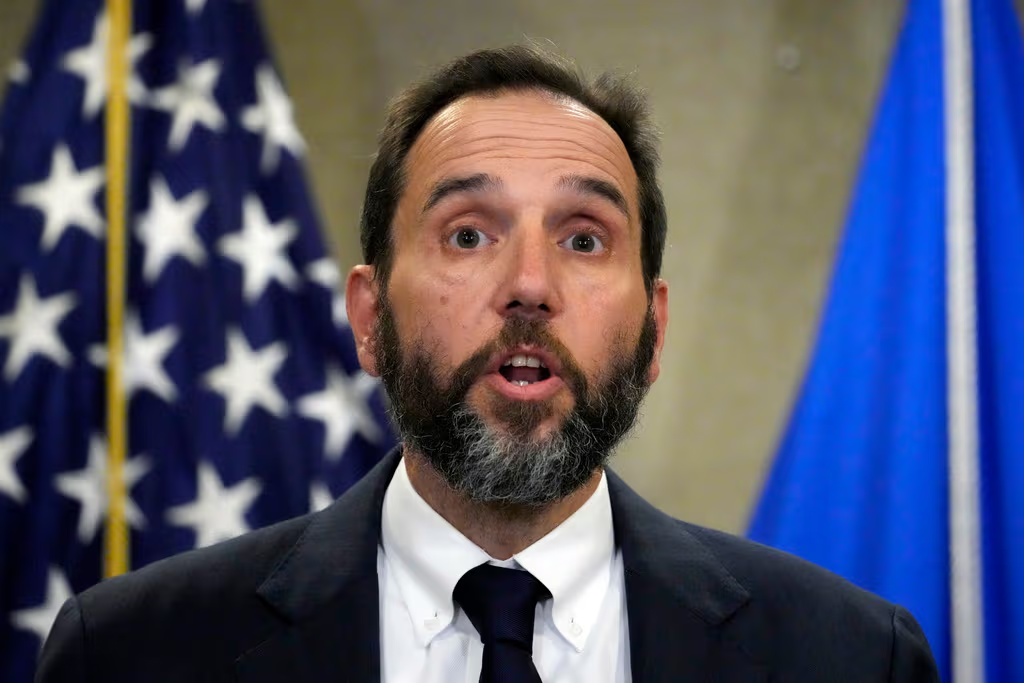Jack Smith Is Prosecuting Trump With One Eye on the Supreme Court, Which Could Be Trump’s Last, Best Chance of Avoiding Prison
Indications emerge that the special counsel played it safe rather than hand up against the former president a charge of insurrection.

Special Counsel Jack Smith’s portrait, in his latest filing, of President Trump as a criminal anomaly in American history camouflages a series of subtle signals to Judge Tanya Chutkan that telegraph the prosecutor’s plans and his fear of a Pyrrhic victory that could be undone on appeal.
Mr. Trump’s efforts to have the January 6 charges against him dismissed — he has marshaled constitutional, statutory, and presidential immunity arguments — come just three months before the beginning of jury selection. Mr. Smith, though, is already planning an appellate strategy, and he appears to be enlisting Judge Chutkan in the effort to make any convictions stick.
The prosecutor’s alertness to appeal could stem from an awareness that, as he readily admits, the case against Mr. Trump is unprecedented and involves novel facts and untested applications of law — no president has ever faced charges that he conspired to overturn the results of a presidential election.
Mr. Smith’s urging of Judge Chutkan to “consider and decide first” Mr. Trump’s claims that he is protected from prosecution by both presidential immunity and the constitutional ban on double jeopardy discloses a tactical understanding of a case’s cadence. The special counsel requests this prioritization “to prevent undue delay and maintain the trial date.”
The special counsel, in aligning himself with Judge Chutkan’s desire for a prompt trial, explains that those two defenses are “subject to interlocutory appeal.” This is exceptional. Usually, only final orders can be appealed, to prevent forum shopping in the midst of a case and in order to build a coherent record at the trial level for a higher court to review.
An interlocutory appeal, though, transpires when a non-final order — meaning one short of a verdict — is eligible for appeal. Mr. Smith’s hunch appears to be that Mr. Trump will immediately ask the District of Columbia Circuit of the United States Court of Appeals, which sits above Judge Chutkan, to review any decision that does not result in the case’s immediate dismissal. An immediate appeal to the Supreme Court could follow.
Both the District of Columbia Circuit and the Supreme Court are likely to be more receptive to Mr. Trump’s arguments than Judge Chutkan, who has denounced him from the bench while presiding over the trials of January 6th protesters, who she sentenced to harsh prison terms. She has also imposed a gag order on the former president.
Such an appellate hearing will take time, which is why Mr. Smith wants Judge Chutkan to start the clock as soon as possible. In the special counsel’s other case, concerning the retention of classified documents at Mar-a-Lago, Mr. Trump has asked for a May trial date to be pushed to “at least mid-November 2024.” The presiding judge there, Aileen Cannon, appears to be contemplating a delay.
Mr. Smith’s awareness of the danger of an appellate reversal appears to have shaped not only his desire for a particular order with respect to which issues are heard when but also which charges to bring in the first place. One consideration in the special prosecutor failing to bring a charge related to insurrection, it appears, is because such a count could bolster Mr. Trump’s double jeopardy argument.
That is because it was on one charge of incitement to insurrection that the former president was acquitted at impeachment. Mr. Smith now tells Judge Chutkan that the “indictment did not charge the defendant with an incitement offense,” meaning that there is “no plausible argument” that Mr. Trump “ was acquitted in the Senate of the same offenses charged in the indictment.”
Mr. Smith also asserts that double jeopardy would not apply even if he charged Mr. Trump with insurrection, because an impeachment trial is a political tribunal rather than a criminal one. Such a double barrelled approach — it’s called “arguing in the alternative” — also appears tailor built to weather appellate review. It offers multiple pathways to find for the government.
It is possible, though, that an appeals court — or the high court — could look askance at Mr. Smith’s avoidance of an insurrection charge in favor of allegations of violations of statutes like the Sarbanes-Oxley Act, originally conceived to combat financial fraud. It appears likely that the justices will, eventually, want to rule on the contours of presidential immunity. For the special counsel, it could be a matter of when, not if, he has to make his case to the Nine.

